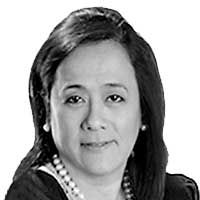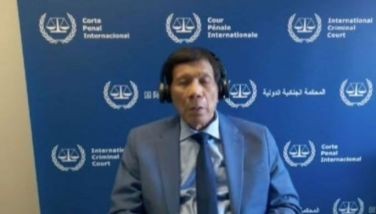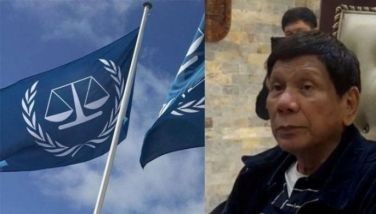Tatay Digong

Someday in the future – if it hasn’t happened yet – psychologists and sociologists may try to dissect and understand the Philippines’ singular Rodrigo Duterte, just as universities have started offering subjects on extremely popular icons and world figures.
Here, after all, is a political thespian who took the Philippines by storm, unapologetic about his unorthodox style of leadership, expletive-laden rhetoric and misogynist jokes.
Rody, who has been called many names – The Punisher, Dirty Harry and the beloved Tatay Digong – is still so undeniably popular.
The mammoth crowds that gathered from Davao to The Hague and many places in between for some 200 rallies to celebrate the man’s 80th birthday prove this.
In Davao, there was a sea of green at the center of the city as Duterte supporters wore green shirts to show their support. They called for the return of their Tatay Digong and their chants reverberated across Davao.
Indeed, the Duterte magic lives on and there’s no lack of neologism to describe it. Dutertemania, Dutertephoria, Dutertissimo – take your pick.
At one point, at the height of his power as the country’s 16th president, Duterte was even touted as the world’s most popular leader.
Last March 28, Rody turned 80 inside the International Criminal Court’s detention facility at The Hague where he will soon face crimes against humanity.
But Duterte’s still remarkable popularity shouldn’t be surprising. How can Rody not be endeared to the people, then and all the more now, especially with President Marcos, who is not exactly enjoying high popularity ratings, seen as the villain who sent Rody to the ICC?
Rody is a man who speaks the language of the masses – complete with expletives.
No doubt he stood out among the many Philippine presidents, most of whom came from the wealthy elite, the perfumed and well-heeled crowd, who, for the longest time, marginalized the people as they protected only the interests of their class.
Duterte, on the other hand, was not an Ivy League graduate nor a crunching-number economist. Nor was he a decorated general.
He is a proud son of Mindanao, the first Philippine president from what may be the most plundered region in the country, abused for its bountiful resources.
The Filipino masses identified with Duterte – at least that’s what he made them believe. He slept soundly in a mosquito net-covered bed, rode his motorbike around town, ate in carinderias and spoke their language.
Performative governance
On top of that, he was a leader who had mastered the art of performative governance, which, as described in a Cambridge University Press publication, is the theatrical deployment of language, symbols and gestures to foster an impression of good governance among citizens.
His duplicity is a testament to this. There was Duterte, The Punisher, the anti-corruption and anti-criminal crusader in public, and there was the man described by those close to him as the quintessential gentleman, kind and charming, not someone you would think could commit crimes against humanity.
What comes to mind is a haunting book by Croatian journalist Slavenka Drakulic titled They Would Never Hurt a Fly, published in 2004, which discusses the personalities of people on trial at The Hague, including Slobodan Milosevic. Her profiles reveal they weren’t monsters to begin with but ordinary people, and brilliantly points out that ordinary people do terrible things.
Milosevic, for instance, killed to stay in power.
“It is nice to kill people this way. I kill them nicely. I don’t feel anything,” said another defendant in the book’s title essay, after killing as many as a hundred people in a single month.
Duterte would be a perfect addition to the book.
Another reason for Duterte’s unparalleled popularity is the fact that Filipinos love the underdog and are perennially searching for heroes.
That is why Ang Probinsyano was for the longest time the most popular TV series; why Erap became president; why Metro Manila turns into a ghost town whenever Manny Pacquiao has a boxing match and why even washed-up celebrities win in our elections. Here is where anyone can pretend to be a hero.
The father figure
And in a country where the patriarchy ruled for centuries – and still does – Filipinos also still long for that quintessential father figure. Thus, Tatay Digong to them, is God’s gift to this country.
And then there’s Filipinos’ moral ambiguity, made worse by an underlying cognitive dissonance, described as a psychological state in which people unknowingly hold fundamentally conflicting beliefs.
They know he has killed and they believe that killing is wrong, yet they accept it.
Why is this? Filipinos – no thanks to centuries of colonization – have not learned to think critically enough.
We have allowed ourselves to be influenced by slapstick noontime shows and sensationalized soap operas that dominate our daily lives. Add to that all the fake news and propaganda spreading like wildfire on social media now.
The result is a society that thrives on entertainment and empty promises from false heroes who offer the people an alternate reality.
This is one of the many ironies hounding our country today. We long for genuine change, yet we don’t want accountability. We want a better Philippines yet we can’t stand to see a former president who has wronged his people brought to justice. We want peace and order and yet we don’t care if criminals and innocent children are killed in cold blood.
We long for a good leader, yet in truth, we really don’t.
* * *
Email: eyesgonzales@gmail.com. Follow her on X @eyesgonzales. Column archives at EyesWideOpen on FB.
- Latest
- Trending



























